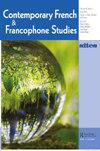leila Sebbar和Assia Djebar的作品中声音的位置
IF 0.2
4区 文学
0 LITERATURE, ROMANCE
引用次数: 0
摘要
摘要本文旨在探讨声音在亚西亚·杰巴尔和Leïla·西巴尔写作中的地位和意义。通过揭示这些作家自传体作品中反复出现的声音领域和阿拉伯语或法语声音的纯粹听觉体验,我认为,在双语、后殖民背景下,声音在混合主体性的构建中起作用。这些文本中非语义声音的共鸣似乎是一种超越相互冲突的语言身份的策略,似乎传达了对原始和基本身份的倾向,象征着对阿拉伯女性声音的怀旧,同时也表明了与两种语言之间的矛盾心理。这两种语言在同质的声音和副语言领域中结合在一起,最终在法语文学文本中共存并产生共鸣,这实际上类似于“第三个地方”。关键词:Assia DjebarLeila Sebbarecrituresonoritehybriditelitterature法语Notes1 Cet(中央东部东京)构建一个适应德马条主德因为学校德乌普萨拉,仿麂皮,”l 'ecriture des儿子在Assia Djebar et Leila Sebbar:埃斯佩斯de la subjectivite hybride”[http://urn.kb.se/resolve?urn=urn: nbn公司禁止:se: uu:女主角- 495765]。2杰巴肯定地说:“法国文化协会(dans unentretien avec Laure Adler sur France Culture)的会员们,一定会把所有的纪念品都拿出来。”东东在支付mediterraneen,不该l 'air是很多解脱,sature de著德语言不同,德语言du在外,等欧勒环境des l 'interieur是女同性恋者,他也,元rempli de杂音,de soupirs ou的短剑在explosaient, l一个侧面布景'auteur se souvient sonore le vacarme反应不是这般简单,但是impliquait一proximite,”我说,ce monde sonore,兜售de meme mes首映式的印象,是l获得recu像一个chaleur”(阿德勒)。32003年和2010年分别有两份报告。3 .联合国本文章由计算机程序翻译,如有差异,请以英文原文为准。
De la place des sons dans l’écriture de Leïla Sebbar et Assia Djebar
AbstractThis article sets out to interrogate the place and implications of sound in the writing of Assia Djebar and Leïla Sebbar. By uncovering the recurring representations of the acoustic sphere and the pure auditory experience of Arabic or French voices in these writers’ autobiographical works, I contend that sound, in the bilingual, postcolonial context, operates in the construction of a hybrid subjectivity. Seemingly conveying the inclination towards an original and essential identity, symbolized by the nostalgia of the female Arabic voice, as well as indicating an ambivalence in relation to both languages, the resonance of the non-semantic voice in these texts foremost seems a strategy to move beyond conflicting linguistic identities. United in the homogenous sonorous and paralingual sphere, the two languages ultimately coexist and resonate in the Francophone literary text, which resembles, in fact, “the third place.”Keywords: Assia DjebarLeïla Sebbarécrituresonoritéhybriditélittérature francophone Notes1 Cet article constitue une adaptation de ma thèse de master de l’Université de Uppsala, Suède, “L’écriture des sons chez Assia Djebar et Leïla Sebbar : espace de la subjectivité hybride” [http://urn.kb.se/resolve?urn=urn:nbn:se:uu:diva-495765].2 Djebar affirme, dans un entretien avec Laure Adler sur France Culture, que ses tout premiers souvenirs étaient des souvenirs auditifs. Née dans un pays méditerranéen, dont l’air était plein de paroles, saturé de mots, de langues diverses, de langues du dehors, et où le milieu des femmes à l’intérieur était, lui aussi, un espace rempli de bruits, de soupirs ou de cris qui explosaient, l’auteur se souvient d’une coulisse sonore qui n’était pas simplement le vacarme, mais qui impliquait une proximité, “Je dirais que ce monde sonore, tout de même, mes premières impressions, c’est de l’avoir reçu comme une chaleur” (Adler).3 Ces deux récits sont parus en 2003 et 2010 respectivement. Un troisième volet, Lettre à mon père, a été publié en juin 2021 aux éditions Bleu autour, qui a publié en un tome ces trois récits portant sur le thème de l’absence de la langue arabe.4 Cette question sera développée dans ma thèse de doctorat.Additional informationNotes on contributorsCajsa ZerhouniCajsa Zerhouni is a doctoral student at the University of Gothenburg, Sweden. This article is an adaptation of her Master’s thesis, “L’Écriture des sons chez Assia Djebar et Leïla Sebbar : espace de la subjectivité hybride” (University of Uppsala, 2022). Previously a literary translator of French and English, and a musician, her research bears on the thematization of the semiotic field, of sound, and the non-semantic voice, in the autobiographical writing of Assia Djebar and Leïla Sebbar.
求助全文
通过发布文献求助,成功后即可免费获取论文全文。
去求助
来源期刊

Contemporary French and Francophone Studies
LITERATURE, ROMANCE-
CiteScore
0.30
自引率
0.00%
发文量
43
期刊介绍:
An established journal of reference inviting all critical approaches on the latest debates and issues in the field, Contemporary French & Francophone Studies (formerly known as SITES) provides a forum not only for academics, but for novelists, poets, artists, journalists, and filmmakers as well. In addition to its focus on French and Francophone studies, one of the journal"s primary objectives is to reflect the interdisciplinary direction taken by the field and by the humanities and the arts in general. CF&FS is published five times per year, with four issues devoted to particular themes, and a fifth issue, “The Open Issue” welcoming non-thematic contributions.
 求助内容:
求助内容: 应助结果提醒方式:
应助结果提醒方式:


